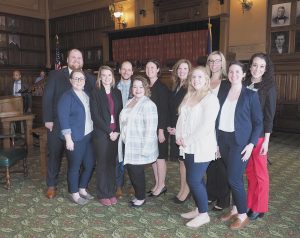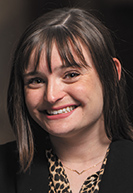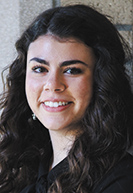[ad_1]
Following an exhilarating couple months of hastened preparing and crafting rock-strong arguments, Indianapolis legal professional Libby Whitaker and her then-classmates sat prior to the Indiana Supreme Courtroom with bated breath.
Indiana College Robert H. McKinney College of Regulation college students, taking part in the legislation school’s Civil Observe Clinic, had drafted from start out to finish an amicus brief in an expungement case showing up prior to the state’s best courtroom in February 2020.
“It was the most awesome experience of my legislation university profession,” Whitaker mentioned in retrospect, who is now an lawyer with Kids’ Voice of Indiana. “It was outstanding.”
Filing amicus briefs is a growing pattern amid law faculty offerings nationwide, according to legislation professors, and two Indiana regulation educational institutions have picked up velocity on the prospect in the latest years. Having the possibility to dive into lively authorized matters by appearing as amicus curiae has been a hands-on option a lot of Hoosier legislation students say has served put together them for the day-to-day grind of training law although finding genuine-entire world practical experience with authentic shoppers.
Picking the mind

The IU McKinney Civil Follow Clinic has been about for a long time, but it was not till various many years back that legislation professor and clinic director Carrie Hagan began thinking of the idea of having her college students collaborate on amicus filings.
As element of its function all through the academic yr, Hagan claimed the clinic routinely checks for submitted expungement appeals. If a situation offers an problem that the students imagine deserves notice, the course collaborates to cause by way of the concern, make your mind up what arguments require to be made and what tangible difference their work could eventually have.
Since 2019, Hagan explained the clinic and its students have been permitted to show up as amicus four situations in the Court of Appeals of Indiana, as very well as the Indiana Supreme Court docket. Her pupils compose 100% of the briefs they file, she claimed.
Very similar perform is becoming carried out at the Notre Dame Regulation School’s Religious Liberty Clinic, where college students are qualified and presented fingers-on expertise to stand for shoppers in national and local religious liberty circumstances.
John Meiser, the Notre Dame clinic’s supervising attorney, reported that his students have filed 10 amicus briefs all through the first total calendar calendar year of the clinic, like 5 in advance of the Supreme Court docket of the United States and in 5 other cases across the country.
“Because the best way to study how to publish for a court is to essentially do it, the extra briefs our students are equipped to work on, the greater their instruction and advancement will be,” Meiser mentioned.
The procedure for the Notre Dame clinic’s amicus submitting commences by accumulating two to 4 students to internally focus on a distinct case, locating what their passions in the circumstance could be and what value they could add by showing as amici.

“The students genuinely type of acquire the direct in strategizing and outlining what we want to argue,” Meiser said. “And then ultimately we’ll get to drafting and do all the study and put jointly a draft of the short and it’ll go by a number of revisions.”
When Hagan’s clinic sits down together to discuss showing up in a circumstance, they request concerns this sort of as: What is it that the bash has reported about why they are pleasing? Do we agree with what they are saying? Do we really feel like we have anything at all that we can add on top rated of what they’re by now expressing? And does what we want to increase truly benefit this scenario for the court?
“If we can reply those thoughts with sort of a resounding ‘yes,’ then we go to the third move,” Hagan stated. “We figure out what we want to say and how we want to say it.”

Katelyn Juerling, a 2016 graduate of IU McKinney with Norris Choplin Schroeder LLP, signed on with the Civil Apply Clinic as co-counsel in its most latest amicus transient for Deon Willford v. Point out of Indiana, 21A-XP-02426.
Obtaining participated in the clinic herself as a student, Juerling served the existing college students make clear and edit their details. The team would comb by the briefs for several hours, line by line, tying up any free strings.
Viewing the learners operate on their amicus filing was inspiring, she mentioned.
“Not each and every legal professional gets to do any style of movement that goes in front of the Court of Appeals, permit on your own have an amicus temporary that is approved by the Courtroom of Appeals,” Juerling pointed out. “So, these learners that are in this clinic are presently miles ahead of some lawyers in our condition that have didn’t have the opportunity to do that still.”
Equipped for good results
The prep for an amicus brief is arduous perform that typically must be completed ahead of the deadlines in a unique situation, Hagan explained.

Olivia Rogers, a soaring 3L at Notre Dame Law College, stated no a person quick is the exact same and can acquire anywhere from a few months to just a week, based on the deadline, investigation load and client needs.
“I’ve learned so significantly about the course of action of litigation and how timelines generally transform from working day-to-working day primarily based on motions, judge’s orders or new circumstances,” Rogers stated.
Creating amicus briefs in regulation college and doing the job independently with consumers was an amazing understanding possibility, stated Molly Connor, a 2021 IU McKinney graduate. Acquiring participated in the clinic for the duration of the peak of the COVID-19 pandemic, Connor mentioned all course collaboration was donevia Zoom.
They filed as amicus in Pranav Mishra v. State of Indiana, 20A-XP-1726, the place Connor stated the appellate court docket ultimately agreed with the clinic’s key placement, major to a reversal.

“The possibility to do the psychological gymnastics of how to make (an amicus quick) have a robust argument right before the court in live performance with 6 other legislation college students and our professor, I feel that’s a definitely exclusive working experience,” she stated.
The transferrable competencies IU McKinney graduate Chandler Clark of Lewis Kappes gleaned from doing the job on amicus submitting in expungement instances – like managing massive volumes of substance and speaking effectively with shoppers – have been significant to his every day lawful follow in the corporate transactional realm, even yrs later on, he reported.
Filing amicus briefs taught Whitaker how to sympathize with clients and believe critically about situations in a way that sitting in a law faculty lecture corridor couldn’t.
“It designed me want to be an advocate for modify,” she explained.

For Rogers, the ability to use ideas she’s realized in the classroom to real daily life scenarios as a legislation pupil has been “incredible.”
“I never ever thought I’d be ready to say that I worked on briefs that have been in advance of the Supreme Court — and did so throughout law university,” Rogers explained. “It’s an honor to operate on these substantial-profile initiatives, but even additional so, it is an incredible possibility for development.”
The get the job done Indiana regulation college students are doing with amicus submitting just before even stepping in the real environment of practicing regulation is vitally vital, according to Hagan.
“You are having to make really distinct, critical lawful arguments in a very apparent way,” she stated. “I feel that provides a real obstacle for the college students. The amount of pride that they have in their get the job done product or service, you can not set a selling price on.”•
[ad_2]
Supply connection








